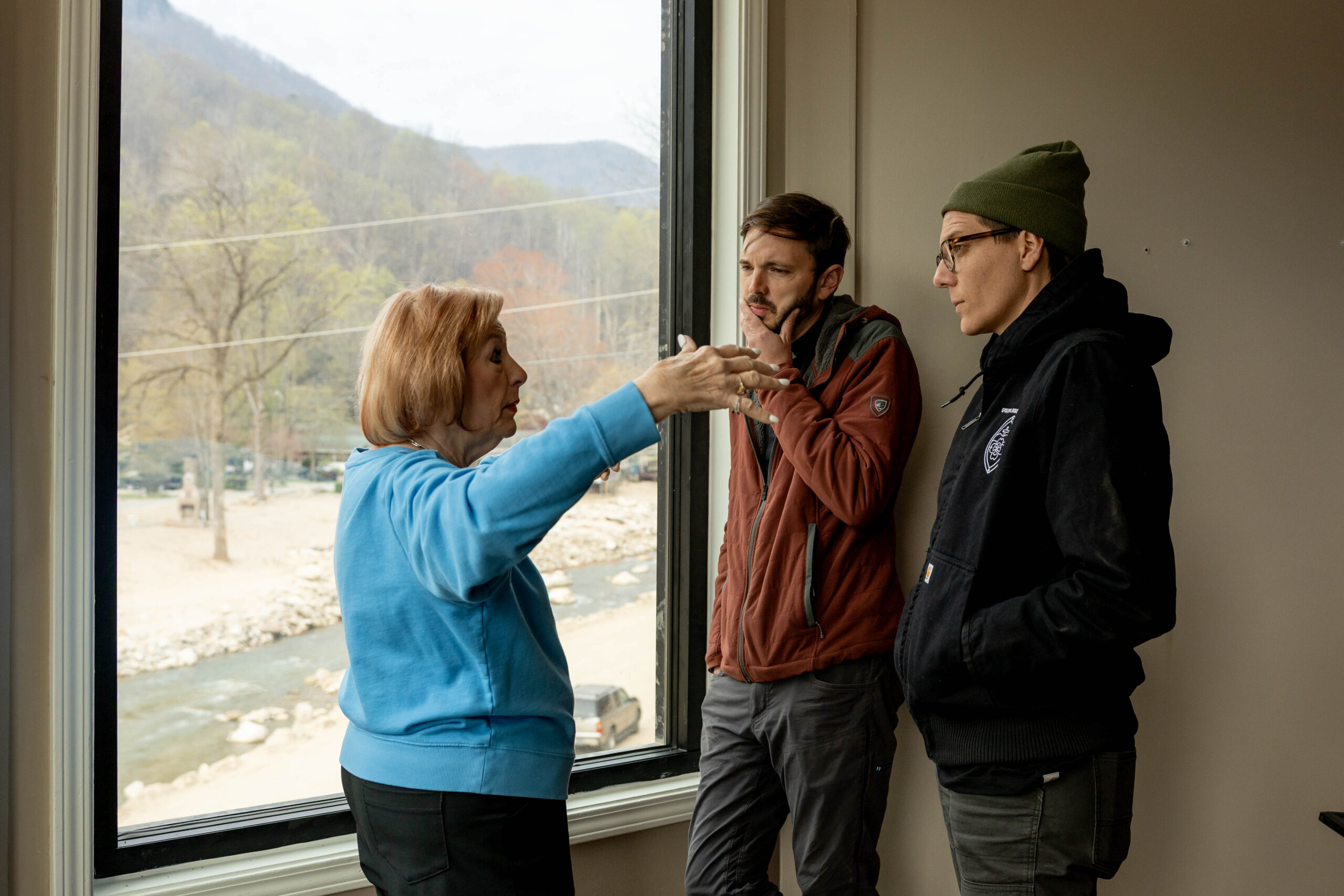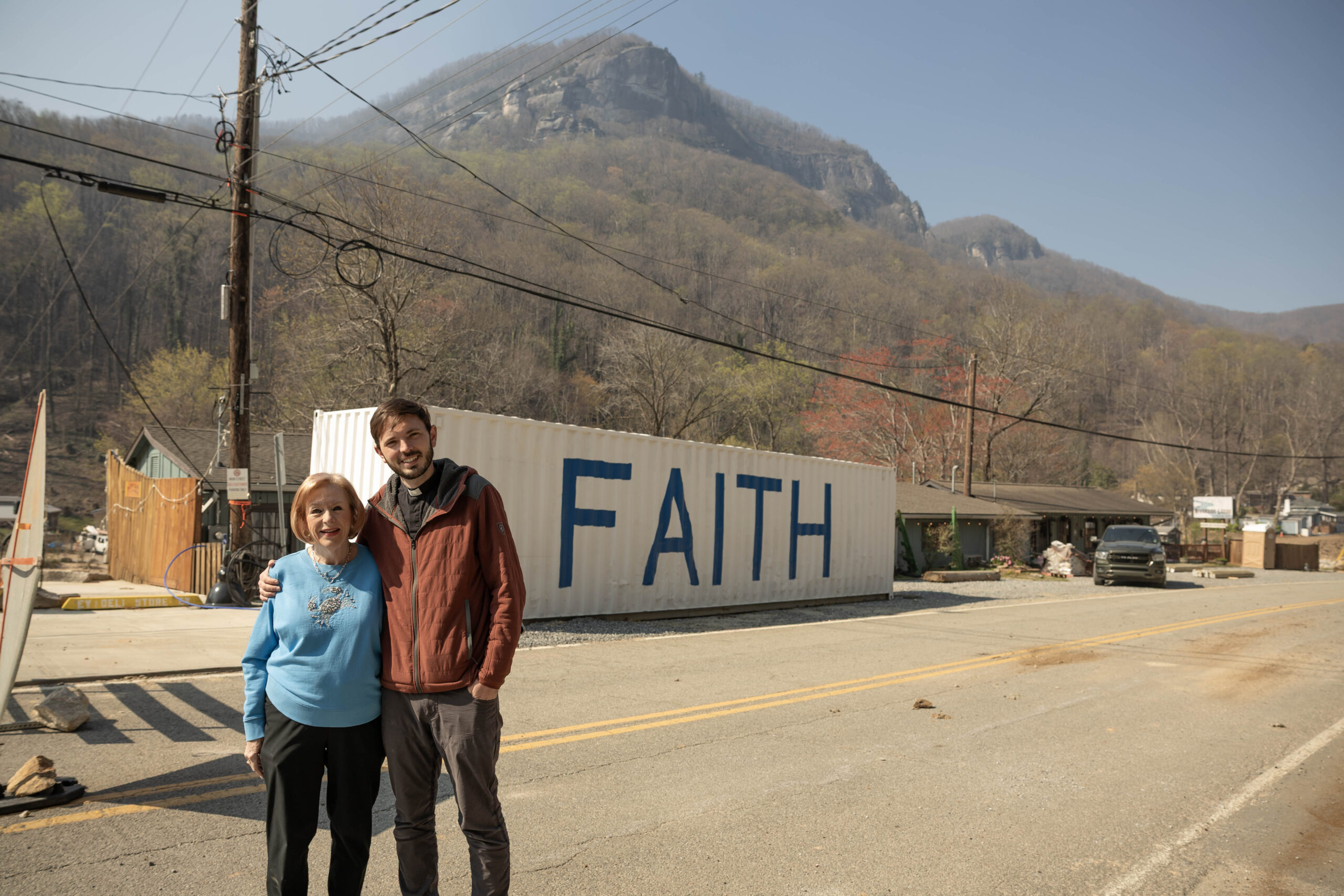The Rev. Kelsey Davis (left), Linda (middle) and the Rev. John Roberts (right) stand outside Carter Lodge.
“After 33 years, Chimney Rock is home,” Linda said. “It’s hard to walk away from the people you built a community with. But, I don’t know if I’ll be strong enough to stay once Carter Lodge is gone.”
Linda grew up in Asheville, North Carolina. In 1992, she married Joe and they started Carter Lodge. They lived and worked at the 17-room inn featuring a deli, market and scenic views of Broad River in Chimney Rock, North Carolina.
Linda and Joe were invested in their community–a small tourist town of under 200 residents. Over the years, Linda served on the women’s auxiliary board. Joe was a volunteer firefighter. Together, they dedicated their time and energy to improvement projects like helping develop the Broad River walkway and community clean ups.
“We are able to go deep and take our time helping people recover at their own pace and in ways they need.”
Joe served three terms as a Junior Warden at the Episcopal Church of the Transfiguration, located just a few miles up the road in Bat Cave, North Carolina. Linda loved that church and the welcoming, generous spirit of the congregation.
Joe passed away in 2021. Linda kept the business going, as a way to honor him and keep investing in the community they both loved. During the summer of 2024, she paid off a 30-year loan they took out together to remodel the lodge after the catastrophic flooding in 1996.
In September, Hurricane Helene dropped 20 to 30 inches of rain across western North Carolina. The water from Broad River, normally less than a foot high in the parts closest to the lodge, reached 42 feet high. The flooding uprooted houses and washed away roughly 60 percent of the businesses in Chimney Rock. Carter Lodge was destroyed.
Linda’s flood insurance provider denied her claim. They said the damage was caused by a landslide, which requires a different policy. Currently, Linda is waiting to see if her property qualifies for a FEMA buyout, which would allow her to sell her land to the government, and use the earnings to start over. Without that government benefit or insurance money to rebuild the lodge, Linda has no viable options. The wait is emotionally, spiritually and financially taxing.

Hurricane Helene devastated western North Carolina, Georgia, Tennessee and Florida. Episcopal Relief & Development, in partnership with affected dioceses including the Episcopal Diocese of Western North Carolina, provided emergency housing, food and supplies to people in need.
Today, Episcopal Relief & Development is partnering with the Episcopal Diocese of Western North Carolina to staff disaster response leaders and develop a long-term recovery plan to meet community needs for economic revitalization and spiritual encouragement. The program is matching skilled volunteers with opportunities to help restore homes, businesses and key infrastructure, and working through church-led programs to provide financial assistance to people most affected by the storm.
“We have the gift of proximity,” said the Rev. Kelsey Davis, Bishop’s Deputy for Disaster Response & Recovery for the Episcopal Diocese of Western North Carolina. “We are able to go deep and take our time helping people recover at their own pace and in ways they need.”

Members of the Episcopal Church of the Transfiguration have been supporting Linda–hauling heavy appliances from the lodge for her to sell, and helping make ends meet.
“It’s been churches, from all over the country, that have come together to show up by bringing and sending resources,” said the Rev. John Roberts, rector of the Episcopal Church of the Transfiguration.
The Rev. Roberts and members of the Episcopal Church of the Transfiguration have also been accompanying Linda and other survivors through their grief by giving them the opportunity to share about their experience during check-ins and visits.
“It would be very hard to make it through the day without having this kind of love and support,” Linda said. “I thank God every day for blessing me with people who have helped me. It’s very humbling.”
Our Results in Numbers
-
380,000
peoplereached by US response and recovery program
-
3,700
participantstrained in disaster resilience
-
867
householdsparticipated in disaster preparation activities
-
123,000
peopleparticipated in disaster mitigation training
A Note from our Director
Eric Weaver, Director, Global Disaster Response & Resilience, explains the value of partnering locally when it comes to disasters.